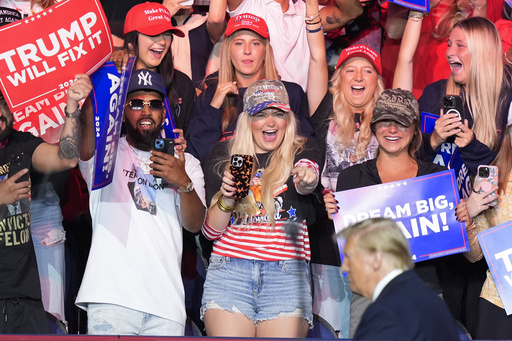Donald Trump has proclaimed himself as the “protector” of women, suggesting that this role is maintained regardless of their preferences. Throughout his campaign, he has associated with individuals who utilize crude and sexist remarks and has expressed concern regarding the possibility of wives voting in opposition to their husbands’ choices. The former president has also claimed that Kamala Harris, the Democratic vice-presidential candidate aspiring to be the first female president, would be “overwhelmed” in dealings with male leaders he deems strong, stating she might “melt down” in such circumstances.
Trump’s remarks and the rhetoric of some of his close allies have exemplified sexist attitudes. Former Fox News anchor Tucker Carlson, during an event featuring Trump, audibly compared him to a stern parent dispensing tough love to a “bad little girl,” suggesting a metaphorical need for discipline. Additionally, Charlie Kirk, founder of a prominent conservative youth organization, asserted that any man casting his vote away from Trump is somehow less of a man and criticized women secretly voting for Harris, claiming they are undermining their husbands’ efforts to provide for the family.
During a recent rally, Trump found humor in an inappropriate joke about Harris, recalling that a speaker at his Madison Square Garden event earlier had controversially likened her to a sex worker under the control of “pimp handlers.” Following a claim, again devoid of evidence, that Harris fabricated her past work experience at McDonald’s, a voice from the crowd shouted a derogatory comment, which prompted Trump’s laughter and engagement with the attendees. While he attempted to distance himself from the inflammatory remark, he remarked how resonant the crowd’s reactions were.
The presence of a significant gender gap has been persistent for Trump since Harris’ entry into the race. Polls indicate a notable preference among women for Harris over Trump, a divide that could be a determining factor in the upcoming tightly contested election. Women’s voting participation typically exceeds that of men, evidenced by their making up 53% of the electorate in 2020. Approximately 53% of early voters this year have been women, based on political data.
Nikki Haley, who once vied for the GOP nomination alongside Trump, emphasized the importance of how women are addressed and their prioritization of pressing issues, cautioning against overt masculinity that seems to characterize Trump’s campaign. Meanwhile, despite having served as U.N. ambassador during Trump’s presidency, Haley has not appeared alongside him at his rallies, despite her indications of willingness to do so.
Trump’s campaigning has largely focused on attracting male voters, particularly younger males, through engagements on popular podcasts catering to this demographic and appearances at sporting events. The atmosphere of his rallies has been infused with a hyper-masculine vibe, highlighted when a former professional wrestler removed his shirt during a convention. Additionally, the song “It’s A Man’s Man’s Man’s World” is frequently played at his events, reinforcing the tone.
The challenges surrounding Trump’s relationship with women have been underscored by his nomination of three Supreme Court justices responsible for overturning Roe v. Wade, implementing restrictions on abortion rights across Republican-led states. Despite his attempts to reconnect with women voters, the outcome has often been dissatisfying. In a rally in Gastonia, North Carolina, Trump acknowledged the backlash to his assertions about being a protector of women, yet continued to assert this claim while insisting women love him and that his viewpoint is justified.
Trump expressed that he sees protection of women as paramount, asserting that he would offer that security within their homes, especially in instances where violence is concerned. He communicated a belief that many women would prefer his leadership during dangerous situations. His campaign is banking on a focus on crime and immigration concerns to appeal to female voters described as “security moms.” Personal stories from mothers affected by crime have been a key feature at rallies, including a heartbreaking account shared by a mother whose daughter was tragically killed.
The campaign seems to believe that Trump’s frequent criticisms of transgender rights resonate positively with certain sectors of his audience. While speaking in Virginia, he showcased female athletes from a college embroiled in a controversy involving a transgender athlete, aiming to emphasize his stance on the matter. A spokesperson for Trump contended that women deserve a president who prioritizes security and economic prosperity for families, paralleling his viewpoints.
Several supporters voiced their appreciation for Trump’s protective promises. One small-business owner expressed a desire for security, reflecting a belief that many people share similar sentiments. She mentioned a personal affinity for the concept of an “alpha male,” particularly associating it with positive experiences from her upbringing. Others noted that the debate surrounding abortion significantly influences women’s perceptions of Trump, yet some staunch supporters remain focused on his governance rather than his personal demeanor.
On the other hand, Harris has taken the opportunity to highlight Trump’s controversial statements in her narratives. By engaging with electorate segments traditionally loyal to Democrats and participating in focused outreach, she aims to bridge her own gender gap. In her affirmative response to queries about the role of women in the election, she stated her commitment to represent all Americans.
Trump has countered remarks from Harris’ advocates suggesting his dismissive attitude toward strong women by recalling the roles women played in his prior campaign strategies. Nevertheless, he continues to deploy gender-specific language in his opposition to Harris, questioning her ability to engage with formidable world leaders, and has also made dubious claims about his impact on reproductive health.
As the election nears, the dynamics of gender and domestic issues continue to shape the political landscape, leaving both candidates to navigate their approaches in appealing to an electorate with diverse perspectives and priorities.


